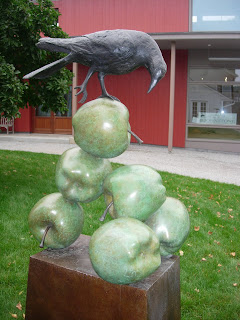 Whilst many lessons could be gleaned from this biblical story, my reflection centred on the productive way in which the five sisters confronted Moses. It could have been so different...
Whilst many lessons could be gleaned from this biblical story, my reflection centred on the productive way in which the five sisters confronted Moses. It could have been so different... Henry Cloud in his book Integrity, wrote that "one of the most important aspects of character of life, without question, is one’s ability to confront. It is true that you get what you tolerate. If the nature of reality is that there are always problems, if you do not confront them and instead tolerate them, then problems are what you will have (p. 191).
photo: vancouver (2006)
 On the other hand, “a lot of people confront easily, even too easily, and yet do it in a manner that is more destructive than helpful. The combative or angry or critical, demeaning confronter does not solve problems. He or she usually drives problems more deeply into hiding by creating an atmosphere of fear rather than resolution (p. 191).
On the other hand, “a lot of people confront easily, even too easily, and yet do it in a manner that is more destructive than helpful. The combative or angry or critical, demeaning confronter does not solve problems. He or she usually drives problems more deeply into hiding by creating an atmosphere of fear rather than resolution (p. 191).This is one of the areas where character integration is so important. If you fail to confront, you lose. But if you confront poorly, you will also lose. So, you must confront, but confront well. That means that the truth-telling side of your character must be integrated with the loving and caring side of your character. When you show up to deal with a problem, you must bring both of them together. Confront the problem, but in a way that preserves the relationship and the person. If you err on either side, the wake will be affected.
In theology, we hear of grace and truth, which means to be “for the person” and have standards. .. The important thing is to say what needs to be said, and to say it in a way that shows that you care about the person…. “I try to go hard on the issue and soft on the person.” That means that both his truth telling and his care for the connection came together at once. … Honesty without love is not integrity.
 ¨ But this requires a character that has neutralized the truth… If he or she is still running with a lot of anger inside that has never been integrated and metabolized, then confrontation is going to be toxic, “beating people up”. Love and healing must first have taken place inside people’s souls, or they might be in danger of treating others not in the way they themselves want to be treated, but in the way they have been treated. They repeat the abuse that they have been subjected to in their own experience (p. 192).
¨ But this requires a character that has neutralized the truth… If he or she is still running with a lot of anger inside that has never been integrated and metabolized, then confrontation is going to be toxic, “beating people up”. Love and healing must first have taken place inside people’s souls, or they might be in danger of treating others not in the way they themselves want to be treated, but in the way they have been treated. They repeat the abuse that they have been subjected to in their own experience (p. 192).  So, they ask themselves before the confrontation, “what do I want to have happen as a result of this confrontation?”
So, they ask themselves before the confrontation, “what do I want to have happen as a result of this confrontation?” - If they are impulsive and don’t do that, then they might just care about releasing anger, or forcing someone to do things differently, or getting revenge and making someone feel bad and themselves feel better.
But if they are mindfully integrated, then what they do is desire an integrated outcome. They think, “I want to solve the problem, make the relationship stronger, help the person develop, and empower their development.” So, they confront in a way that is going to bring about that wake. (p.193).


















